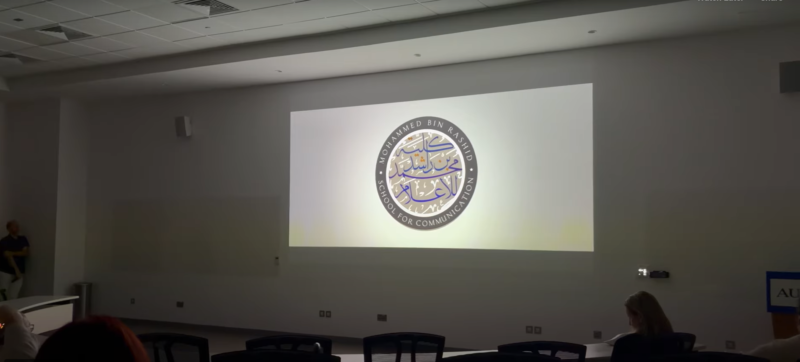Behind the Books
The American University in Dubai has a diverse curriculum enjoyed by about 2,500 students. At AUD, students and faculty have come to expect cutting edge facilities and course materials. But in the case of textbooks, the frequent replacement of old editions by new ones has become very expensive. Some question whether the business of textbook production hasn’t gotten in the way of affordable learning. The light at the end of the tunnel: The SGA bookstore.
The SGA (Student Government Association) bookstore at American University in Dubai is a second-hand book source for students who are looking for alternatives at a lower cost. Unlike the bookstore on the ground floor of the C-building, the SGA bookstore is located in a small office on the second floor a door away from the restaurants. The SGA bookstore has over two hundred books catalogued.
The idea of a bookstore started when two students, Philip Apaza and Khadija Saeed, voiced their concerns over the constantly replaced editions of textbook materials, raising the costs to buy new text books while a pile of old textbooks kept growing because they could not be resold without a system. That is when both Philp and Khadija agreed that something had to change.
According to Philip Apaza, President of the SGA and The AUD MUN (Model United Nations), the bookstore idea was born in 2005. He major is international studies and is getting ready to graduate soon.
Philip and a fellow student, Khadija Saeed, who was the first manager of the bookstore, had been discussing the potential for opening a used bookstore in AUD, but had not come around to it until the fall of 2010.
Philip stated that, “we first tested the concept during the summer months of 2010 and debuted the new system fully in Fall 2010.” Not only does the SGA Bookstore system help the students of AUD, and in return, as Philip said, “on top of this, the commission made off the sales could be used to fund student events and activities.”
The system used to run the SGA bookstore is, however, outdated. The AUD bookstore downstairs does not associate itself or its staff members with the SGA Bookstore. It is entirely run on volunteer students and a very old computer system that logs books and their editions that are still in use in AUD.
Since Philip has given the responsibilities of the bookstore to Mina Sarkies, an electrical engineering student in his second year, as well as two other volunteers (Sarah and Josh) whose work is keeping the books in logged and in good condition. Mina, Sarah and Josh are always on the lookout for more volunteers though, as books in the tiny office can pile as high as two meters on the office metal racks.
According to Mina, work in the bookstore entails book checking for torn pages, hidden gum and ‘art’ or graffiti. If they are in acceptable form, they are given a code and logged into the system. Next is checking the valid books still being used by professors, into the system, but because the system is outdated, problems arise.
“This was one of the most difficult aspects. It required a powerful and fast way of cataloging titles, prices, editions, students and more,” said Philip.
Philip also noted that, “the physical organization of the bookstore itself was much more simple and just involves arranging by course code.”
One of the tasks given to volunteers at the SGA Bookstore is to sort out over one hundred books that are no longer in use by the university. The SGA Bookstore system does not have a program for the older books. The office staff of the first floor bookstore confirmed that they did not have a log of the older books.
One staff member said, “the book list that the university receives comes from the suppliers in Abu Dhabi, and once the books have arrived and the list has been covered, the list is not kept. The company takes it back, so we do not have a record of all the books brought to the university.”
When asked about the system, the office staff said that they did not keep a log of the old editions and books that AUD received nor did they know of a site that would help trace the books to catalogue them by computer. No computer system means logging manually, which can take about an hour and a half to two hours every other day. Putting the books in order, checking for quality and then cataloging them. Subjects range from biology, mathematics, computer science and broader subjects like business, accounting and languages.
The only problem with the bookstore, as Mina and Philip have both said, is finding a place or charity to donate the books to.

